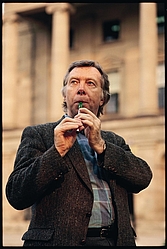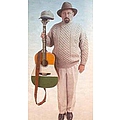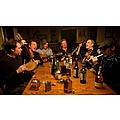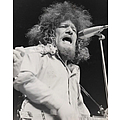Биография Tommy Makem
Thomas "Tommy" Makem (November 4, 1932 – August 1, 2007) was an internationally celebrated Irish folk musician, artist, poet and storyteller. He was best known as a member of The Clancy Brothers and Tommy Makem. He played the long-necked 5-string banjo, guitar, tin whistle, and bagpipes, and sang in a distinctive baritone. He was sometimes known as "The Bard of Armagh" (taken from a traditional song of the same name) and "The Godfather of Irish Music". Makem was born and raised in Keady, County Armagh (the "Hub of the Universe" as Makem always said), in Northern Ireland. His mother, Sarah Makem, was an important source of traditional Irish music, who was visited and recorded by, among others, Diane Guggenheim Hamilton, Jean Ritchie, Peter Kennedy and Sean O'Boyle. His father, Peter Makem, was a fiddler who also played the bass drum in a local pipe band named "Oliver Plunkett", after a martyr of the Cromwell age. His brother and sister were folk musicians also. Young Tommy Makem, from the age of 8, was member of the St. Patrick's church choir for 15 years where he sang Gregorian chant and motets. He didn't learn to read music but he made it in his "own way". He started to work at 14 as a clerk in a garage and later he worked for a while as a barman at Mone's Bar, a local pub and as a local correspondent for The Armagh Observer. He emigrated to the United States in 1955, carrying his few possessions and a set of bagpipes (from his time in a pipe band). Arriving in Dover, New Hampshire, he worked at Kidder Press, where in 1956 his hand was accidentally crushed by a press.[4] With his arm in a sling, he left Dover for New York to pursue an acting career. The Clancys and Makem were signed to Columbia Records in 1961. The same year, at the Newport Folk Festival, Makem and Joan Baez were named the most promising newcomers on the American folk scene. During the 1960s, The Clancy Brothers and Tommy Makem performed sellout concerts at such venues as Carnegie Hall, and made television appearances on shows like The Ed Sullivan Show and The Tonight Show. The group performed for President Kennedy. They also played in smaller venues such as the Gate of Horn in Chicago. They appeared jointly in the UK Albums Chart in April 1966, when Isn't It Grand Boys reached number 22. Makem left the group in 1969 to pursue a solo career. In 1975, he and Liam Clancy were both booked to play a folk festival in Cleveland, Ohio, and were persuaded to do a set together. Thereafter they often performed as Makem and Clancy, recording several albums together. At a concert in 1977, Tommy noticed an audience member having a good time and exclaimed, "What have you been smoking? Good whatever you have, pass it around to the rest of them we'll all get goin'!" He once again went solo in 1988. Throughout the 70's and 80's Makem performed both solo and with Liam Clancy on The Irish Rovers various television shows, which were filming both in Canada and Ireland. In the 1980-90s, Makem was a principal in a well-known Irish music venue in New York City, "Tommy Makem's Irish Pavilion." This East 57th Street club was a prominent and well-loved performance spot for a wide range of musicians. Among the performers and visitors were Paddy Reilly, Joe Burke, and Ronnie Gilbert. Makem was a regular performer, often solo and often as part of Makem & Clancy, particularly in the late fall and holiday season. The club was also used for warm-up performances in the weeks before the 1984 reunion concert of The Clancy Brothers and Tommy Makem at Lincoln Center. In addition, the after-party for Bob Dylan's legendary 30th Anniversary Concert Celebration at Madison Square Garden in 1992 was held at the Irish Pavilion. In 1997 he wrote a book, Tommy Makem's Secret Ireland, and in 1999 premiered his own one-man theatre show, Invasions and Legacies, in New York. His career includes various other acting, video, composition, and writing credits. He also established the Tommy Makem International Festival of Song in South Armagh in 2000. Makem was married to Mary Shanahan, a native of Chicago, for 37 years, and had four children - daughter Katie Makem-Boucher, and sons Shane, Conor and Rory. They also had two grandchildren, Molly (Dickerman) Makem and Robert Boucher. Mary died in 2001. Makem's three sons (who perform as "The Makem Brothers") and nephews Tom & Jimmy Sweeney continue the family folk music tradition. Makem died in Dover, New Hampshire on August 1, 2007, following a lengthy battle with lung cancer. He continued to record and perform until very close to the end. Paying tribute to him after his death, Liam Clancy said, "He was my brother in every way" He is buried next to his wife at New Saint Mary Cemetery in Dover. Makem was a prolific composer/songwriter. His performances were always full of his compositions, many of which became standards in the repertoire. Some, notably "Four Green Fields", became so well known that they were sometimes described as anonymous folk songs. During the fall of the Iron Curtain, Makem often proudly told the story that his song "The Winds Are Singing Freedom" had become a sort of folk anthem among Eastern Europeans seeing a new future opening before them. Makem's best-known songs include "Four Green Fields", "Gentle Annie", "The Rambles of Spring", "The Winds Are Singing Freedom", "The Town of Ballybay", "Winds of the Morning", "Mary Mack", and "Farewell to Carlingford". Even though many people mistakenly believe that Makem wrote "Red is the Rose", it is a traditional Irish folk song. Makem had a gripping stage presence – the result of years of public performance, a charismatic personality, and a bard's voice. An army of friends and fans attended his frequent concerts, many recognizing each other at far-flung venues. Performances frequently included the following familiar elements: Original Makem compositions; the first set often began with "The Rambles of Spring" The standard repertoire of folk and Irish music, both well-known and little-known (but never "Danny Boy", "When Irish Eyes are Smiling", "Toorah Loorah Looral", or other forbidden requests) Oddball songs, such as "Bridie Murphy and the Kamikaze Pilot" (Colm Gallagher) or "William Bloat" (Raymond Calvert) Poetic recitations, often as introductions to songs; a frequent source was William Butler Yeats. (Thus "Gentle Annie" usually began with "When You Are Old and Grey", and Four Green Fields usually began with Seamus Heaney's "Requiem for the Croppies".) Jokes, often silly, made funnier through repetition: "If your nose is running and your feet smell, you're upside down." Rarely: monologues, such as Marriott Edgar's "The Lion and Albert" Exhortations, nearly always successful, for the audience to join in the singing He received many awards and honours, including three honorary doctorates: one from the University of New Hampshire in 1998, one from the University of Limerick in 2001, and one from the University of Ulster in 2007; as well as the World Folk Music Association's Lifetime Achievement Award in 1999. With the Clancy Brothers he was listed among the top 100 Irish-Americans of the 20th century in 1999.[10] A bridge over the Cocheco River on Washington Street in Makem's long-time home of Dover, New Hampshire, was named the Tommy and Mary Makem Memorial Bridge in 2010.
Тексты песен Tommy Makem
Оставить комментарий
Что вы думаете об исполнителе Tommy Makem? Напишите ваш комментарий.
Альбомы Tommy Makem
| Title | Release | ||
|---|---|---|---|
| 1 | The Tommy Makem Songbag | 1989 | |
| 2 | Greatest Folksingers of the 'Sixties |


















